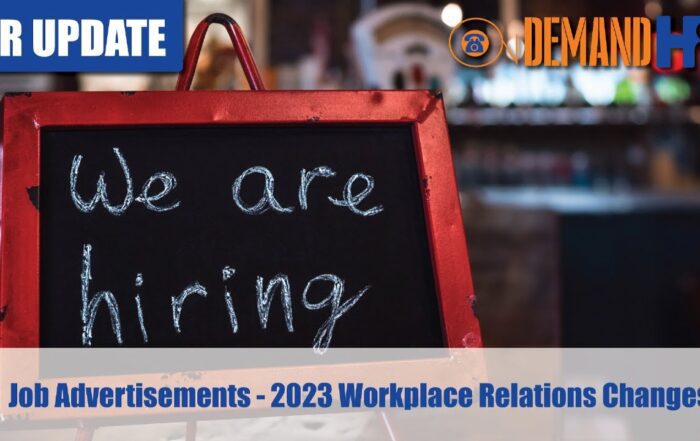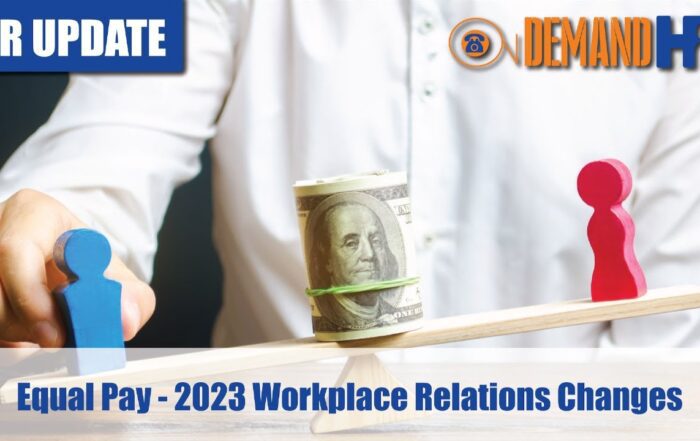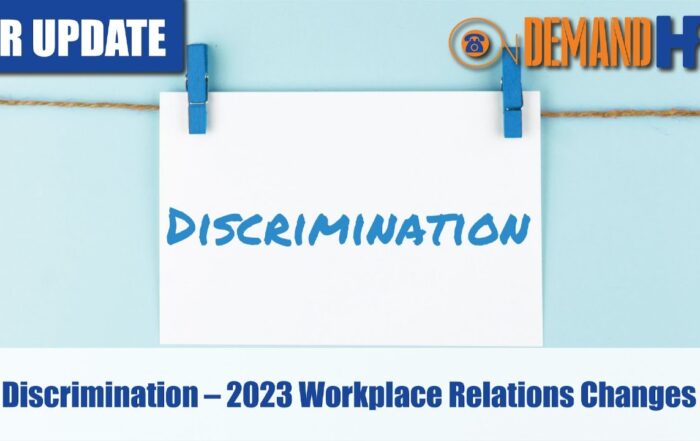Fair Work Mandatory Vaccination Warning
On Monday 27 September, Fair Work Deputy President Lyndall Dean made some significant commentary in a judgement regarding the unfair dismissal case of Kimber vs Sapphire Community Coast Aged Care, which is very important for business to consider when regarding workplace vaccination. Today we will take a look at this case, Deputy President Deans comments, and consider the potential implications for business.
Share the HR or workplace relations challenge facing your business and one of our experienced consultants will be in touch within 24 hours with a strategic action plan or discover the best strategy yourself by accessing out free online training library.
Transcript
On Monday 27 September, Fair Work Deputy President Lyndall Dean made some significant commentary in a judgement regarding the unfair dismissal case of Kimber vs Sapphire Community Coast Aged Care, which is very important for business to consider when regarding workplace vaccination. Today we will take a look at this case, Deputy President Deans comments, and consider the potential implications for business.
In the case itself, Kimber was dismissed by Sapphire for refusing a directive to get a flu vaccination. At the time of the dismissal, the requirement for a flu vaccination was part of the NSW governments response to Covid-19 for all aged care workers. Kimber refused the flu vaccination stating that she had an adverse reaction to it in the past and her employment was subsequently terminated as a result.
In the original case, the termination was found to be fair and reasonable, as Kimber was unable to medically substantiate that past adverse reactions to vaccines were directly linked to the flu vaccination. Following the initial decision, Kimber sought leave to appeal this decision which was rejected by the full bench by stating that Kimber held a “general anti-vaccination position” and it would not be in the public interest to allow the appeal to proceed. The Fair Work Vice President Hatcher and Commissioner Riordan went further to state “we do not intend, in the circumstances of the current pandemic, to give any encouragement to a spurious objection to a lawful workplace vaccination requirement”. However, Deputy President Dean did not agree with her colleagues, and following the refusal to allow the case to be appealed, the Australian newspaper reported from Deputy President Dean as follows:
“Ms Dean said she hoped the majority decision was “recognised as an anomaly and not followed by others”. “All Australians should vigorously oppose the introduction of a system of medical apartheid and segregation in Australia,” she said. “Blanket rules, such as mandating vaccinations for everyone across a whole profession or industry regardless of the actual risk … is a lazy and fundamentally flawed approach to risk management and should be soundly rejected by courts when challenged.”
Ms Dean also challenged the views of some politicians about the unvaccinated population. “The statements by politicians that those who are not vaccinated are a threat to public health and should be “locked out of society” and denied the ability to work are not measures to protect public health. “They are not about public health and not justified because they do not address the actual risk of Covid. These measures can only be about punishing those who choose not to be vaccinated,” Ms Dean said. She said Australians who held “anti-vaccination sentiments” were entitled to the full protection of the law, including fair work laws.”
From Deputy President Dean’s comments, it seems there is not necessarily a uniform view within the Fair Work Commission when it comes to the subject of workplace vaccinations, and termination of employment which could arise as a result. So it may come down to each commissioners determination of the matters at hand.
In our view, this is another reason that businesses should proceed with caution when considering vaccination policies, and the most sensible position at this time seems to be implement no more than the government requirements, purely and simply because there is a lack of certainty about enforceability. Additionally, governments both state and federally have stated on many occasions that for most industries vaccination is not mandatory, and that these are matters for individual businesses to consider.
In summary, Deputy President Dean’s statements confirm that if a unfair dismissal be lodged in response to a mandatory workplace vaccination policy, there is likely to be a contest on whether such a policy, would be valid reason for termination. There is no doubt we will see more decisions on these matters in the coming months, and we will certainly keep our audience informed of any updates.






